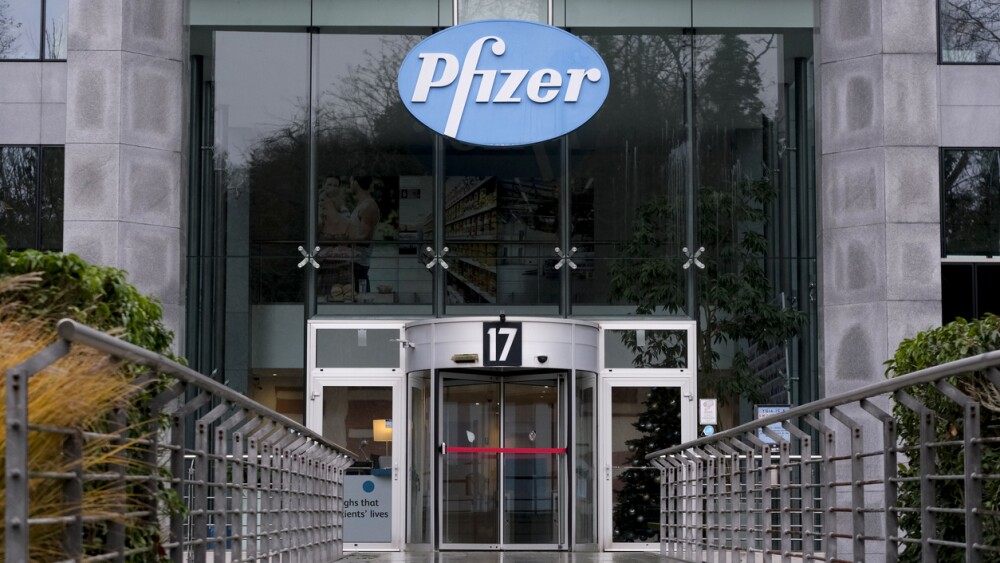TORONTO--(BUSINESS WIRE)--Antibe Therapeutics Inc. ("Antibe") (TSXV: ATE, OTCQX: ATBPF) announced today the completion of the previously announced validation studies being performed on the Company's lead drug, ATB-346. These studies were initiated as a consequence of ATB-346 inducing an elevation of liver enzymes in some subjects taking the higher doses of the drug (750 and 1500 mg/day), and were aimed at gaining a better understanding of the drug's potency, absorption, metabolism and excretion characteristics. The results of these studies support progression to Phase 2 of development of this drug in patients with osteoarthritis.
In the first set of studies, as previously announced, the suppression of the activity of the cyclo-oxygenase (COX) enzyme, which accounts for the anti-inflammatory and pain-killing effects of ATB-346 (and all other NSAIDs), was substantially greater and longer lasting than had been predicted from the monitoring of blood naproxen levels. NSAIDs are well known to cause liver damage in some patients when taken at high doses.
In the second set of studies, rats were administered ATB-346, in which the hydrogen sulfide-releasing portion of the molecule was 'tagged' with a radioactive marker, thereby allowing it to be tracked after it was administered to each rat. This enabled monitoring of the excretion of ATB-346 and of its metabolites, and any accumulation of the drug in particular organs (such as the liver). There was no significant retention or accumulation of the radiolabel in any tissues, with more than 99% being excreted in urine. In rats treated daily with ATB-346 for four days, less than one-tenth of 1% of the radiolabel remained in the liver 8 hours after the final administration of the drug. Additionally, levels of retention of the radiolabel in other organs, including the kidney, stomach, small intestine and lungs, were extremely low. These studies also identified a number of metabolites of ATB-346, all of which were rapidly cleared.
The results of these studies warrant the continuation of development of ATB-346. They suggest that ATB-346 may be effective at lower doses than previously expected -- doses that were observed to be safe and well tolerated in the Phase 1 study. The studies also suggest that ATB-346 will produce beneficial effects with only once-daily dosing. Accordingly, Antibe plans to move forward with Phase 2 studies and will submit an application to Health Canada in early 2016.
About Antibe Therapeutics Inc.
Antibe develops safer medicines for pain and inflammation. Antibe's technology involves linking a hydrogen sulfide-releasing molecule to an existing drug to produce a patented, improved medicine. Antibe's lead drug ATB-346 targets the global need for a safer non-steroidal anti-inflammatory drug (NSAID) for chronic pain and inflammation. ATB-352, the second drug in Antibe's pipeline, targets the urgent global need for a safer analgesic for treating severe acute pain, while ATB-340 is a GI-safe derivative of aspirin. www.antibethera.com.
Antibe's subsidiary, Citagenix Inc., is a leader in the sales and marketing of tissue regenerative products servicing the orthopedic and dental marketplaces. Since its inception in 1997, Citagenix has become the largest source of knowledge and experience in the Canadian medical device industry when it comes to bone regeneration and is known as a valuable reference and resource by clinicians. Operating in Canada through its direct sales teams, and a network of distributor partnerships around the world, Citagenix Inc. is active in 15 countries. www.citagenix.com.
Neither the TSX Venture Exchange nor its Regulation Services Provider (as that term is defined in the policies of the TSX Venture Exchange) and no stock exchange, securities commission or other regulatory authority accepts responsibility for the adequacy or accuracy of this release nor approved or disapproved of the information contained herein.
Forward-Looking Information
This news release includes certain forward-looking statements which may include, but are not limited to, information on drug development. Any statements contained herein that are not statements of historical facts may be deemed to be forward-looking, including those identified by the expressions “will”, “anticipate”, “believe”, “plan”, “estimate”, “expect”, “intend”, and similar expressions. Forward-looking statements involve known and unknown risks and uncertainties that could cause actual results, performance, or achievements to differ materially from those expressed or implied in this news release. Factors that could cause actual results to differ materially from those anticipated in this news release include, but are not limited to, not achieving commercial revenue from Antibe’s anti-inflammatory and pain drugs, not achieving the milestone specified in the license agreement, risks associated with drug development generally, not obtaining future financing on adequate terms, or at all, anticipated sales not achieving expected volumes and not obtaining TSX Venture Exchange final approval for any pending transactions. The sections on risks contained in the Company's Prospectus and annual Information Circulars are expressly incorporated herein. Antibe Therapeutics Inc. assumes no obligation to update the forward-looking statements or to update the reasons why actual results could differ from those reflected in the forward-looking statements except as required by applicable law.
Antibe Therapeutics Inc.
Dan Legault, 416-473 4095
Chief
Executive Officer
dan.legault@antibethera.com




